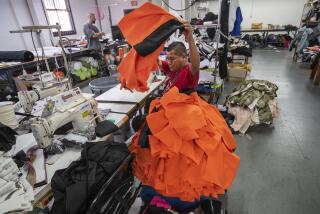Factory orders in September tumble far more than expected
- Share via
WASHINGTON — Factory orders in September dropped far more than analysts expected as the U.S. manufacturing sector continues to suffer from the economic slump.
The Commerce Department said Tuesday that factory orders fell 2.5% from August, compared with the 0.8% drop expected by Wall Street economists surveyed by Thomson Reuters. That’s on top of a revised 4.3% decline in August, which was the steepest in almost two years.
Excluding autos and aircraft, orders fell 3.7%, the sharpest drop since 1992, when the department began tracking sector-specific changes.
Orders for nondefense capital goods excluding aircraft, considered a good indication of business investment plans, declined 1.5%. That comes after a 2.3% drop in August and indicates companies are cutting back on investments, probably because of the economic slowdown and difficulty in getting credit.
Durable goods orders -- big-ticket items such as construction machinery expected to last at least three years -- rose 0.9%, up from a preliminary estimate of 0.8% last week.
But that increase was overwhelmed by a 5.5% drop in orders of nondurable goods, which include food, clothes and petroleum products.
Orders for primary metals, including steel and aluminum, dropped 4.6%, while orders for computers and electronic equipment declined 1.8%.
The Commerce Department said last week that the economy contracted at an annual rate of 0.3% in the third quarter. Businesses reduced their spending on equipment at a 5.5% pace, according to last week’s report.
The department said Tuesday that orders for autos and auto parts increased 2.7% in September, after plummeting 10.6% in August.
Still, that increase is likely to be temporary as automakers had two disastrous months in September and October. The reluctance of banks to lend has hurt automakers by making it difficult for potential buyers to get auto loans.
More to Read
Inside the business of entertainment
The Wide Shot brings you news, analysis and insights on everything from streaming wars to production — and what it all means for the future.
You may occasionally receive promotional content from the Los Angeles Times.










